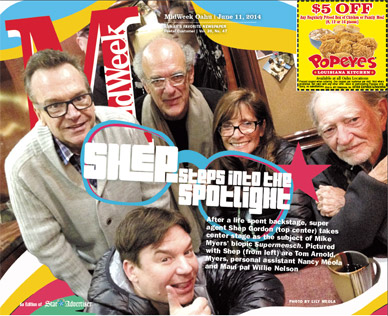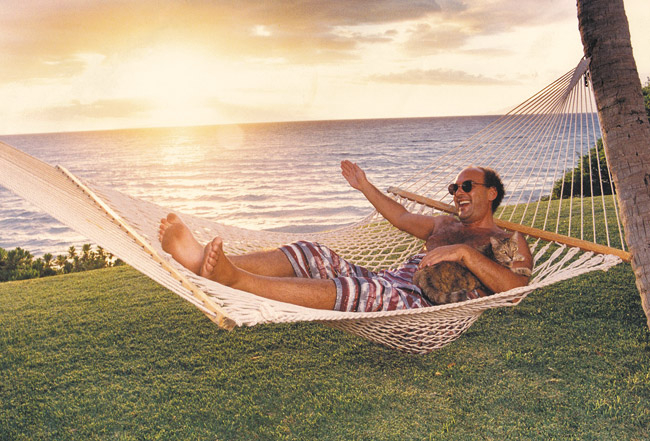Shep Steps Into The Spotlight
Locally, alongside Moffatt, Gordon has produced concerts including UB40, The Who, Aerosmith and Willie Nelson. But perhaps his most visible and lasting contribution to Hawaii has been his work with local chefs in creating the Hawaii Regional Cuisine movement. Gordon, who has been to culinary school and often traveled with renowned chef Roger Verge, had been cultivating the concept of celebrity chefs — and wanted Hawaii to also benefit from that.
“There were a lot of great chefs (in Hawaii). I wanted to try to do something for them to make their lives better,” Gordon explains. “It was hard to take any one individual living in Hawaii and really make an impact, so we got a group together.”
mw-cover-061114-shepgordon_1
“He gave us guidance … and insight. He was a friend and an adviser,” recalls Mark Ellman, one of the founding chefs of HRC, adding that the group would gather at Gordon’s place for meetings/parties.
HRC alumni include some of the most well-known local chefs: Alan Wong, Sam Choy and Peter Merriman.
Gordon also partnered with Ellman to open Maui Tacos and Mala Wailea. Currently, the pair is working on what Gordon calls the “next wave” of HRC with the launch of Migrant at the Wailea Beach Marriott, headed by chef Sheldon Simeon (of Top Chef fame). While the HRC of the 1990s relied primarily on European tastes, Gordon feels the next wave will offer a wider range of influences.
“He was someone who was raised on the techniques of HRC, but brought a (Filipino) influence into it,” Gordon says of Simeon.
Although Gordon explains that his strategy as a manager has been mainly “flying by the seat of your pants,” he has had one reigning mantra through it all: Act with compassion.
Even when it comes to the paparazzi. He’ll often try to strike a deal with them: They can take their photo, the star gets to choose it, and he gets a cut of the money that he donates to the Maui Food Bank.
For Gordon, this is the “only (philosophy) that makes any sense.” It has a place in his personal life, too. A friend of the Dalai Lama, Gordon serves on the board of the Tibet Fund, which supports Tibetan refugees. In 2007, he brought the Dalai Lama to Maui for talks that drew 10,000 people on back-to-back days. He also helped to raise four children — the grandchildren of a former girlfriend now all in their 20s and 30s. He bought the Williams family a house, took them on vacations and brought them along on tour with Alice.
If Gordon has been on the sidelines of the spotlight, it’s because he prefers it that way. For all of those years he spent making people famous, Gordon remains surprisingly skeptical, if not downright critical, of fame itself. Early in Supermensch, he shares a warning he would give prospective clients before taking them on: “If I do my job perfectly, I will probably kill you.” When I ask him about this later, he elaborates: “I will make them very famous, and fame kills.”
“I had no real reason to be in the spotlight,” Gordon says. “And there is nothing I find attractive about it … I enjoy having my anonymity.”
After a pause, he adds: “Although that seems like it is fading.”
That fade has been in conjunction with the release of the film. Although he’s been around fame his whole life, it’s been more like he was toeing the surface. Now, it looks as though he will become fully submerged.
“It is wild, really wild,” he says. “It is hard not to become cold because you want to be compassionate to everyone … Fame has such an aura that that person telling you that they saw you 20 years ago is important to them. You don’t want to become the kind of guy who doesn’t care. But you also want to have a life.
“I don’t think anybody balances it well,” he adds. “I am at the tip of the iceberg here. Hopefully I will keep my humanity and my compassion, but I can already see how tasty it is.”
He’s been grappling with early signs of becoming recognizable: Recently, on his way to an interview in New York, he was approached by a woman who said she had seen Supermensch. She had a question for Gordon she hoped he could help her out with. Gordon cut her off. He had to go. He was late for his interview.
But the thing is, what really tore him up was not that someone approached him; it was that he felt bad he was not able to answer her question.
“I had to ditch her. That’s tough, you know?” he laments. “That’s tough stuff.”
After establishing chefs as bonafide celebrities, Gordon quit being a manager, save, of course, for Cooper: “I felt like I had done what I needed to do and was going to check out what my life was rather than managing other people’s lives.”
In that time, he got married. Then he got divorced. He visits Hana when he gets the chance (“Oh my god, that is the greatest place in the world.”), hangs out with the Williams kids (“Chase is having his baby’s first luau in about 10 days … and I had dinner with Amber last night in L.A.”) and is working on some new projects (“Anthony (Bourdain) is going to publish my memoir.”).
In addition to the critical reception it has received, Supermensch also has been a crowd-pleaser at festivals. At each premiere, people come up to Gordon and tell him that the film has inspired them to be more giving in their own lives. One couple at the Sun Valley Film Festival, for example, told him that it reminded them to be more generous. And they wanted to start with him. They gifted him some fresh elk, which made delicious elk sausage the next morning.
“It is just nice that that is the effect (Supermensch) has,” Gordon says. “It makes it worthwhile.”
And, there is invariably one woman in each audience who jumps up as the credits roll and screams that she wants to have his baby.
Myers has stated in interviews that he was inspired to create Supermensch after years of hearing Gordon’s stories from his rock ‘n’ roll days.
The two met on the set of Myers’ 1992 film Wayne’s World, in which Alice Cooper made an appearance. When Myers was going through a tough personal time, he called Gordon and asked if he could stay on Maui with him for a couple weeks. Gordon, who has an open-door policy when it comes to his friends, said of course. Myers ended up staying there for two months, with Gordon caring for him “like a baby chick that had fallen out of the nest” as Myers recalls in the film.
“(Myers) stays up late, and he would always say, ‘Before you go to sleep, you got to tell me a story,'” Gordon recalls.
Myers had wanted to make a film about him for years, but Gordon always declined the request. Then, in 2012, Gordon was in the hospital recovering from surgery, unsure if he was going to live or die. When Myers called him to check in, Gordon agreed to the idea of a documentary: “I don’t really know (why), but instead of ‘no’ coming out of my mouth, ‘yes’ came out.”
That Supermensch has its origins in that type of closeness makes sense in the no-holds-barred type of stories that Gordon shares. Tales about dealing pot at Landmark Hotel. Creating a traffic jam just to show off a giant poster of a mostly naked Alice Cooper. The truth behind Cooper’s infamous “Chicken Incident.” Gordon, now in his late 60s, is open about expressing the potential consequences of maintaining the exploits of a freewheeling lifestyle paired with a propensity to work all the time. He bares all in his desire for a family, for a child, for something that will mean he won’t wake up from surgery alone in a hospital room.
While the film could easily slide into more melancholic territory, it’s Myers’ comedic instinct, and moreover Gordon himself, who keeps it from going there.
Does he have regrets?
“No, I wouldn’t say so,” Gordon says. “I am one of those believers that it is all perfect.”







